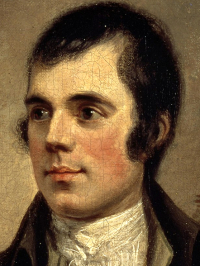On this date in 1759, Robert Burns was born to a poor farming family in Alloway, Scotland, the setting for his poem “Tam o’ Shanter.” He once described himself as being full of “enthusiastic, idiot piety” as a boy and early on questioned religious belief despite being forced to read “A Manual of Christian Belief,” written by his father. He directed his pen against Calvinism in his first poem, “Two Herds” (1785), a satire on rival theology, followed by “Holy Willie’s Prayer” and “Holy Fair.”
Biographers, unsure whether to call Burns an agnostic or a deist, agree he rejected Calvinism (“I am in perpetual warfare with that doctrine.” (Letter to Mrs. Dunlop, Aug. 2, 1788.) He also criticized churches (“Courts for cowards were erected / Churches built to please the priest”), doubted the existence of God (“O Thou Great Being! what thou art / Surpasses me to know”) and the existence of an afterlife.
In his poem “To a Louse on Seeing One on a Lady’s Bonnet at Church,” Burns famously wrote, “O wad some pow’r the giftie gie us / to see oursels as others see us! / It wad frae monie a blunder free us / An’ foolish notions.” The celebrated “Ploughman Poet” bequeathed to the world the lyrics of “Auld Lang Syne,” striking a welcome secular note with which to end the Western New Year, “We’ll take a cup o’ kindness yet / For auld lang syne.”
Burns had 12 children with four women, including nine by his wife Jean Armour. Of the nine, only three survived to adulthood. When he died at age 37 of heart disease, 10,000 people attended the burial. In 2009 the British television channel STV conducted a public vote on who was “The Greatest Scot” of all time. Burns won narrowly over William Wallace. (D. 1797)


